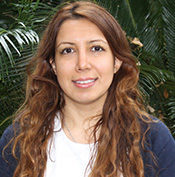Current Trainees
- Somayyeh Nasiripour, Ph.D.
- Azam Alamdari, M.D.
- Sanaz Sajadi, Ph.D.
- Danielle Santana Coelho, Ph.D.
- Lacey Sell, Ph.D.
- Ana Quintero, Ph.D.
Somayyeh Nasiripour, Ph.D. (Mentor: J. Bopassa, Ph.D.) 02/01/2024-present

Dr. Nasiripour graduated from Azad university of medical sciences in 2006 with doctorate degree in pharmacy with the thesis title ’Gastric healing effect of melatonin against different gastroinvasive agents in cholestatic rats’ published in pathophysiology journal in 2010. Then she completed her clinical pharmacy PhD at Tehran University of medical Sciences(TUMS) in May 2013 with the thesis title ”Comparison of the Effects of Enoxaparin and Heparin on Inflammatory Biomarkers in Patients with ST-segment Elevated Myocardial Infarction: A prospective Open Label Pilot Clinical Trial” ,published in Iranian Journal of Pharmaceutical Research (IJPR) in 2014.
Also, she has some experience in teaching medical students and running some clinical trials since she was assistant professor of clinical pharmacy at Iran university of medical Sciences (IUMS) from 2014 to 2023. She did some clinical trials in the field of cardiology in the journal with high impact factor.
After moving to San Antonio, Dr. Nasiripour joined Dr. Bopassa as a postdoctoral fellow.
Azam Alamdari M.D. (Mentor: Marzieh Salehi, MD) 12/01/2024-present
 Dr. Azam Alamdari received her medical doctorate from Iran University of Medical Sciences in 2004. After completion of her residency in Internal Medicine (2010) and fellowship in nephrology (2016) at Tehran University of Medical Sciences she was appointed as assistant professor and then associate professor (2011-2024), where she engaged in both teaching and clinical research, with a particular interest in diabetes and cardiovascular complications.
Dr. Azam Alamdari received her medical doctorate from Iran University of Medical Sciences in 2004. After completion of her residency in Internal Medicine (2010) and fellowship in nephrology (2016) at Tehran University of Medical Sciences she was appointed as assistant professor and then associate professor (2011-2024), where she engaged in both teaching and clinical research, with a particular interest in diabetes and cardiovascular complications.
Two of her notable research contributions have been characterizing the relationship between serum visfatin and type 2 diabetes independent of insulin resistance and adiposity, published in Diabetes Research and Clinical Practice in 2010, as well as determining the relationship between serum vitamin D levels and the extent of peripheral neuropathy in diabetic subjects, published in neurological science in 2015.
Currently, she joined the Postdoctoral program under the mentorship of Dr. Salehi to further research underlying mechanisms involved with impaired glucose tolerance and obesity in high-risk patients with diabetes.
Sanaz Sajadi, Ph.D. (Mentor: Martin Paukert, Ph.D.) 01/05/2025-present
 Dr. Sanaz Sajadi studied circuit mechanisms underlying neuromodulation and learning and their implications for brain function. She earned her Ph.D. in Neuroscience from the University of Texas Health Science Center at San Antonio under the supervision of Dr. Martin Paukert. She has developed expertise in two-photon Ca2+ imaging, transgenic and chemogenetic neuronal manipulation, and behavioral assays.
Dr. Sanaz Sajadi studied circuit mechanisms underlying neuromodulation and learning and their implications for brain function. She earned her Ph.D. in Neuroscience from the University of Texas Health Science Center at San Antonio under the supervision of Dr. Martin Paukert. She has developed expertise in two-photon Ca2+ imaging, transgenic and chemogenetic neuronal manipulation, and behavioral assays.
Dr. Sajadi’s research focuses on the role of norepinephrine in activating cerebellar Bergmann glia and its impact on associative learning. Specific adrenergic receptors, which mediate norepinephrine signaling in glia, are also expressed in vascular smooth muscle cells, highlighting the broader implications of her work for understanding the interplay between brain function and cardiovascular regulation.
Dr. Sajadi’s research aims to bridge the gap between glial function, cognitive processes, and cardiovascular regulation.
Danielle Santana Coelho, Ph.D. (Mentor: J. O’Connor, Ph.D.) 07/01/2025-present
 Dr. Danielle Santana Coelho holds a Ph.D. in Neuroscience from the University of Texas Health Science Center at San Antonio, where her doctoral research focused on the role of the kynurenine pathway in neurodevelopmental disorders. As a postdoctoral researcher, her work centers on understanding how dysregulation of the kynurenine pathway contributes to inflammation-related brain disorders, including autism spectrum disorder (ASD), epilepsy, and stroke.
Dr. Danielle Santana Coelho holds a Ph.D. in Neuroscience from the University of Texas Health Science Center at San Antonio, where her doctoral research focused on the role of the kynurenine pathway in neurodevelopmental disorders. As a postdoctoral researcher, her work centers on understanding how dysregulation of the kynurenine pathway contributes to inflammation-related brain disorders, including autism spectrum disorder (ASD), epilepsy, and stroke.
Through the support of the T32 award, Dr. Santana Coelho will investigate the role of the kynurenine pathway in the pathological and reparative processes following stroke. Her research aims to test the hypothesis that increasing levels of neuroactive metabolites, such as kynurenine and kynurenic acid, can enhance neurogenesis and promote recovery after cerebral ischemia.
Lacey Sell, Ph.D. (Mentor: M. Bhat, M.S. Ph.D.) 07/01/2025-present
 Lacey earned her PhD in IBMS in Neuroscience from UT Health Science Center San Antonio in 2025. Her research focuses on characterization of transgenic mouse models carrying novel mutations in the human CNTNAP1 gene—mutations which have been
Lacey earned her PhD in IBMS in Neuroscience from UT Health Science Center San Antonio in 2025. Her research focuses on characterization of transgenic mouse models carrying novel mutations in the human CNTNAP1 gene—mutations which have been
identified in children and cause profound neurological impairments, including hypomyelination, impaired motor coordination, and early infant mortality. Building on this foundational work, she now focuses on AAV mediated gene therapy strategies to restore CNTNAP1 function in vivo, offering a promising avenue for therapeutic intervention for this fatal condition.
Her research also addresses key challenges in vascular biology, an area of growing significance in gene therapy. A major hurdle in her work is achieving efficient, widespread delivery of therapeutic AAV vectors to both the central and peripheral nervous systems, while minimizing off-target expression in highly vascularized organs such as the heart and liver. These challenges underscore the critical role that the vascular barriers—including the blood-brain and blood-nerve barriers—play in shaping the biodistribution, efficacy, and safety of gene therapies.
Ana Quintero, Ph.D. (Mentor: K. Sharma, Ph.D.) 11/01/2025-present

Dr. Ana Victoria Quintero earned her PhD in Analytical Chemistry from Baylor University. Her doctoral research focused on developing and applying mass spectrometry-based methods for the analysis of carbohydrates, a class of molecules with essential roles in biological function. She utilized in-electrospray ionization hydrogen/deuterium exchange-mass spectrometry (in-ESI HDX-MS) to rapidly label and structurally characterize carbohydrate isomers. Despite the challenges posed by the structural complexity and diversity of carbohydrates, her work aimed to develop new methodologies to study carbohydrate dynamics, which are crucial for understanding structure-function relationships.
She is currently a postdoctoral research fellow in Dr. Sharma’s lab, where she will be performing spatial metabolomics research to identify biomarkers relevant to kidney disease. In particular, she will be utilizing mass spectrometry techniques such as matrix-assisted laser desorption/ionization mass spectrometry imaging (MALDI-MSI) and liquid chromatography/mass spectrometry (LC-MS) to analyze tissue and plasma samples.
